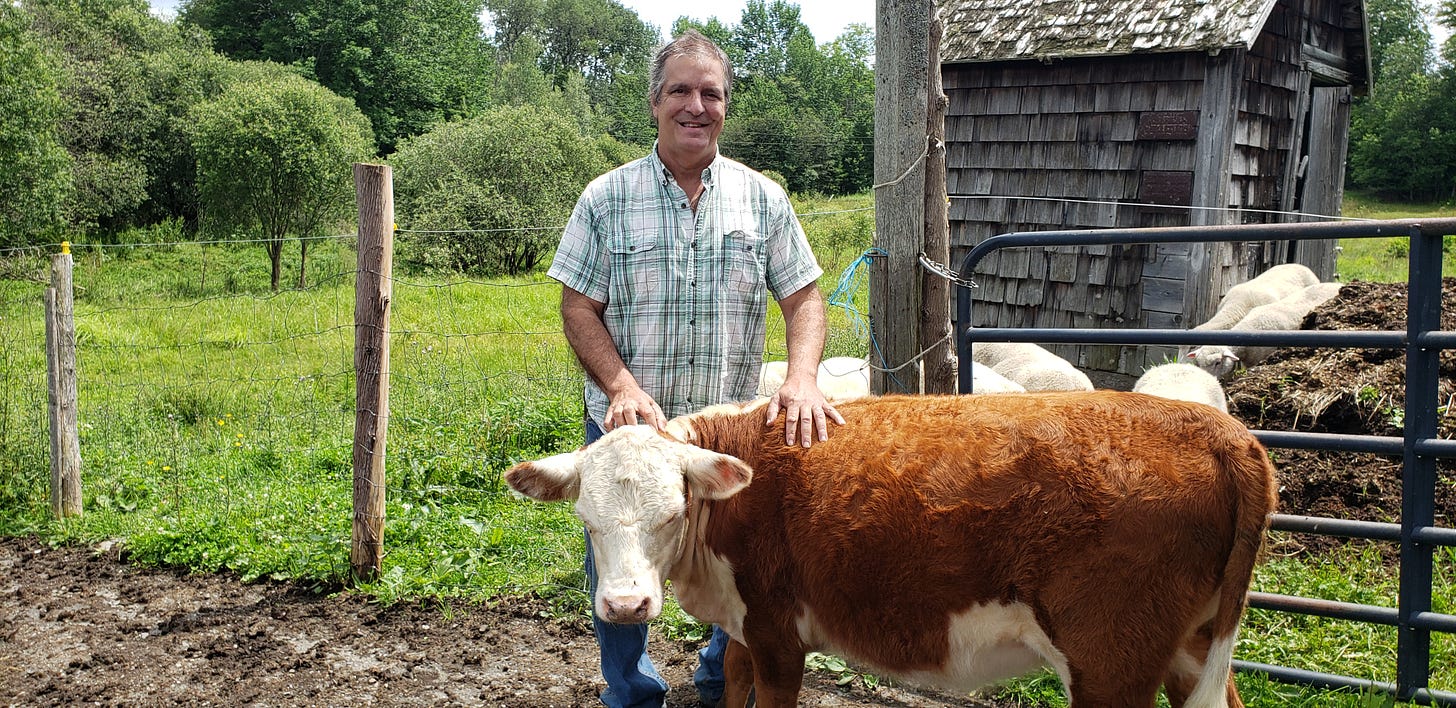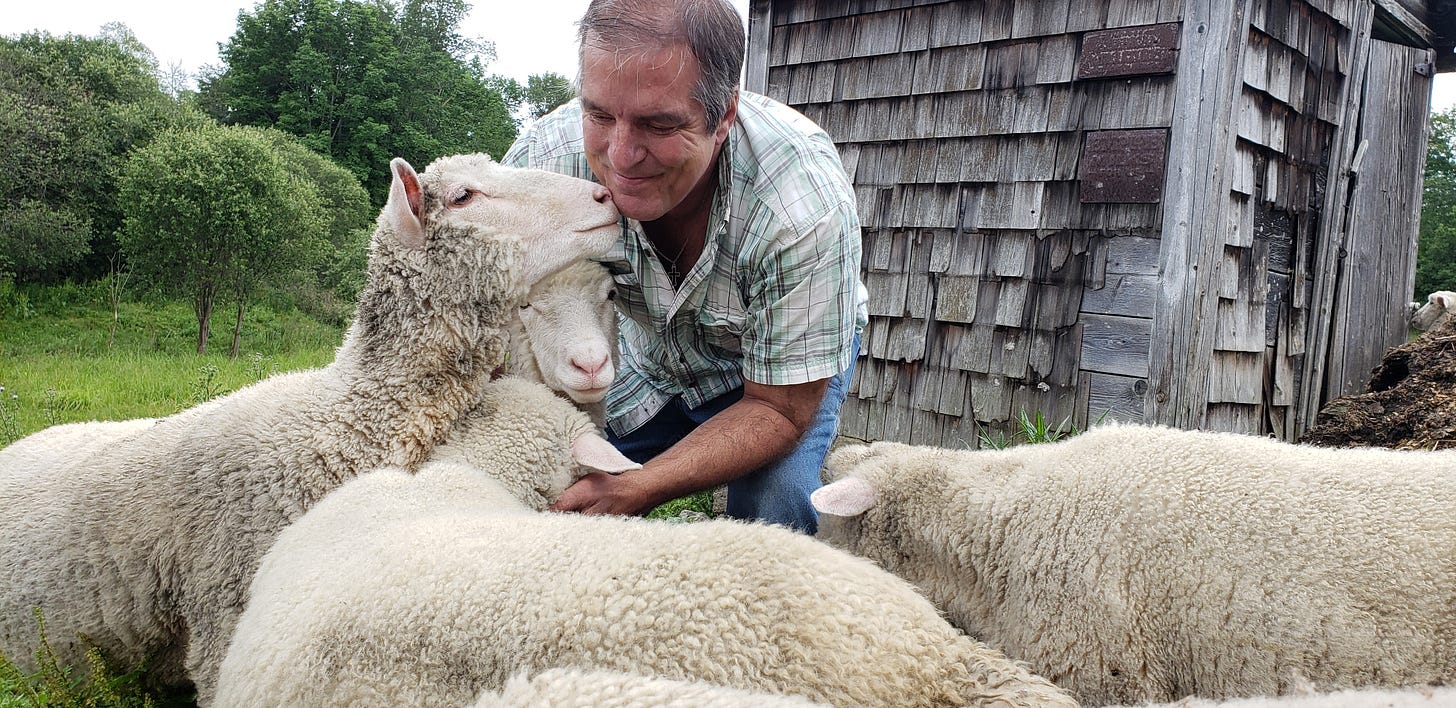September 8, 2016, 7:00 pm
Of our numerous state agencies, the Vermont Agency of Agriculture, Food and Markets (VAAFM) should be the most benign – after all, it looks out for farmers and food safety, right? But our VAAFM is in fact looking out for itself, and for large federal and industrial interests, at the expense of small family farms and businesses. Awareness of the VAAFM’s conflicts must increase if we citizens are to protect our food and farms.
(With Molly, a yearling Hereford heifer. The small shingled shack in the background was used to cool milk cans in a spring water bath. The last family to milk cows here was the Trasks, who closed in 1959….)
The VAAFM resembles cigarette and diet soda manufacturers, seeking to give an impression of benefit where none exists.
By the 1960s, cigarette smoke was determined to be unhealthy, and so the federal government began to regulate cigarettes. The response of cigarette manufacturers was to implement changes that made their products even more addictive and carcinogenic: Cigarettes are now much more addictive – and toxic – than they were 50 years ago. One way this was achieved was by creating “light” cigarettes that actually contained more readily available nicotine, and which manufacturers knew changed smokers’ behaviors so that they would inhale more deeply and actually receive an even higher dose of the drug than in many alternate brands.
Diet soda is another example of a product marketed as helpful but which accomplishes the opposite of what it advertises. Babies of mothers who drink diet soda are themselves much more likely to be overweight, as are elderly consumers of diet rather than regular soda. For such people, “When they think they’re doing something good by drinking artificially sweetened beverages, it’s actually totally counterproductive.” (“Diet Soda and Weight Gain: It’s Not Your Imagination,” Mandy Oaklander, Time, March 17, 2015).
Vermont’s VAAFM is very much like “light” cigarettes and diet soda – it purports to help farmers but actually it is doing the opposite. Two areas where we can see this are water quality and slaughter regulations, which swell the VAAFM budget and pander to federal influences, while doing little if anything for public health.
The government has been displacing farmers in Vermont for decades. Our small dairy farms were pushed off our hills due to technological innovations like bulk tanks, which were mandated by laws enforced by the Ag Department. Small milking operations could not endure the expense of such improvements: Farms with more cows, and more capital, could. The result was a long progression of the big guys pushing the little guys out of the market and off to pasture (so to speak).
One way this was rationalized was to malign the reputation of the small farm, and suggest that farmers could not be trusted to gauge the safety and quality of their milk and other products. True, some farmers did cut corners (one popular urban myth was that some added formaldehyde to their milk to prolong shelf life), but the vast majority cared deeply about the quality of the product they proudly created from family land.
Food production does not benefit from economies of scale. The chief source of agricultural water pollution in Vermont today is a direct result of government-induced consolidation of that industry: large confinement operations with concentrated numbers of animals near major waterways.
Food production does not benefit from economies of scale. The chief source of agricultural water pollution in Vermont today is a direct result of government-induced consolidation of that industry: large confinement operations with concentrated numbers of animals near major waterways. Manure becomes a waste product instead of a healthy soil builder; chemicals, fertilizers, hormones, and drugs never present on the small family farm are now flowing (largely unregulated) into Lake Champlain and other waters. The Vermont Farm Bureau, dominated by large producers, plies Montpelier to help its members evade accountability for this travesty.
Now, the VAAFM is imposing broad new water quality rules on the tiniest of farms, while it has done little to reverse the water quality destruction being wrought by large farms. An old Jersey standing in a streambed is not emitting anything that will alter the sexuality of fish, but there are those who would prefer to encourage the public to feel threatened by a modest herd of cows crossing a brook than by the true culprits: industrial dairy and Big Corn. The VAAFM has heard – and ignored – loud cries from small farms on this issue; it has not been their advocate but their oppressor. Once again, the VAAFM stands as the benefactor of large farms, imposing burdensome regulations on the little farms.
Vermont’s small-scale production of meat and poultry has exploded due to consumer demand for local, healthy food. Our state’s production has doubled in a decade, and we Vermonters are unable currently to meet the booming out-of-state demand. Suddenly the VAAFM has decided that we farmers may no longer slaughter our animals on-farm for public sale unless we comply with restrictions that hurt our competitiveness, stress our animals, and divert slaughter and processing business away from small local businesses and toward large industrial slaughterhouses. The VAAFM has been steadily tightening the “meat safety” noose to destroy many local livelihoods and our Vermont food freedom.
(Some of our yearling lambs. No grain required.…)
Echoing the “formaldehyde in the bulk tank” scares of that earlier attack on the small farmer, the VAAFM and a few misinformed legislators suggest that they must “protect the Vermont brand” from farmers who slaughter animals cruelly, sell sick or weak animals, or who dangle their livestock from manure-drenched tractor buckets while flies swirl overhead. But most farmers don’t do such things, and do not appreciate the VAAFM (which is charged with advancing our farms) maligning our characters and businesses in such fashion. We try to produce the best products we can, for a growing and appreciative customer base that trusts us to care well for our animals.
No one has ever been sickened from Vermont farm-slaughtered meat. Ever. We in Vermont have been sickened by industrial meat from huge factories, but not by our neighbor farmers. And while my customers pay a premium to know that the animal they eat was treated well, the VAAFM mandates that I ship these animals to large slaughterhouses (inspections there are funded by the federal government, allowing VAAFM to hire more inspectors) where they will suffer unnecessary stress. The VAAFM, like diet soda, is promising to make consumers and animals healthier and safer, while it does the exact opposite.
Customers trust Vermont farmers and their products (“the Vermont brand”), while our government maligns the trustworthiness of those farms, and enacts laws to put them out of business. The VAAFM is putting formaldehyde in its bulk tank: It is marketing itself as something healthy, which is the opposite of what it truly is. It is trying to extend its shelf life (expand its power, payrolls and influence) at the expense of the little guy. With weekends and holidays off, guaranteed pay raises while farms decline, and lawmakers who always say yes, VAAFM is not by any means the “agency” of agriculture; it is the agency (“instrument”) of its destruction.
Vermont farmers and consumers: Don’t inhale VAAFM’s toxic fumes; don’t drink their artificial sweetness; don’t comply with their indefensible slaughter and water quality laws. The “Vermont brand” is not the property of bureaucrats; it is the province in which Vermont farms live. There is no abstract intellectual property right at issue here – no “brand” name to own. Local, on-farm food production and distribution have always been, simply, “a way of life.”
Originally published in VTDigger, September 8, 6016.







Hi John,
Here's an article from Epoch Times that nicely summarizes the benefits of milk fats and beef fats that may offer you more ideas to promote these products from small farms.
https://www.theepochtimes.com/health/saturated-fat-the-great-debate_5381319.html
I don't recall what year it was that UVM researchers also published a study finding that milk-drinkers enjoy being more easily able to lose weight because milk protein prevents hunger and hormonal imbalances that can promote metabolic dysregulation. Here's an article discussing this:
https://nutritionandmetabolism.biomedcentral.com/articles/10.1186/1743-7075-10-46
“An old Jersey standing in a streambed is not emitting anything that will alter the sexuality of fish, but there are those who would prefer to encourage the public to feel threatened by a modest herd of cows crossing a brook than by the true culprits: industrial dairy and Big Corn. “
These thought provoking words sum in up in a nutshell. They can make a person smile and cry at the same time .